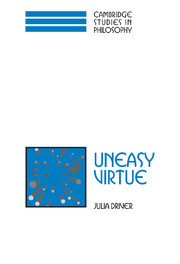4 - A Consequentialist Theory of Virtue
Published online by Cambridge University Press: 22 July 2009
Summary
Consequentialist theories of virtue have been proposed before. David Hume's theory, for example, while not completely consequentialist in nature, draws a compelling connection between utility and virtue. Virtue produces pleasure, and one mechanism of that production is our appreciation of the virtues as socially useful. Benevolence, for example, gains its merit in part from “its tendency to promote the interests of our species and bestow happiness on human society” (Hume 1983, p. 20) The analysis is extended to justice – though in the case of justice “… reflections on the beneficial consequences of this virtue are the sole foundation of its merit …” (ibid.). The value or merit of benevolence, on the other hand, is only partly due to its usefulness:
As a certain proof, that the whole merit of benevolence is not derived from its usefulness, we may observe, that, in a kind way of blame, we say, a person is too good; when he exceeds his part in society, and carries his attention for others beyond the proper bounds.
(Ibid, p. 66)Thus, when the benevolence becomes excessive it is no longer useful, yet it is still regarded as a virtue by Hume. The merit of benevolence must be derived in part from some naturally pleasing quality it has.
But Hume, in this passage, did not consider another explanation for the “kind way of blame.” The trait ‘benevolence’ can, generally speaking, produce good or useful consequences, and thus be a virtue, while occasionally breaking down.
- Type
- Chapter
- Information
- Uneasy Virtue , pp. 63 - 83Publisher: Cambridge University PressPrint publication year: 2001



